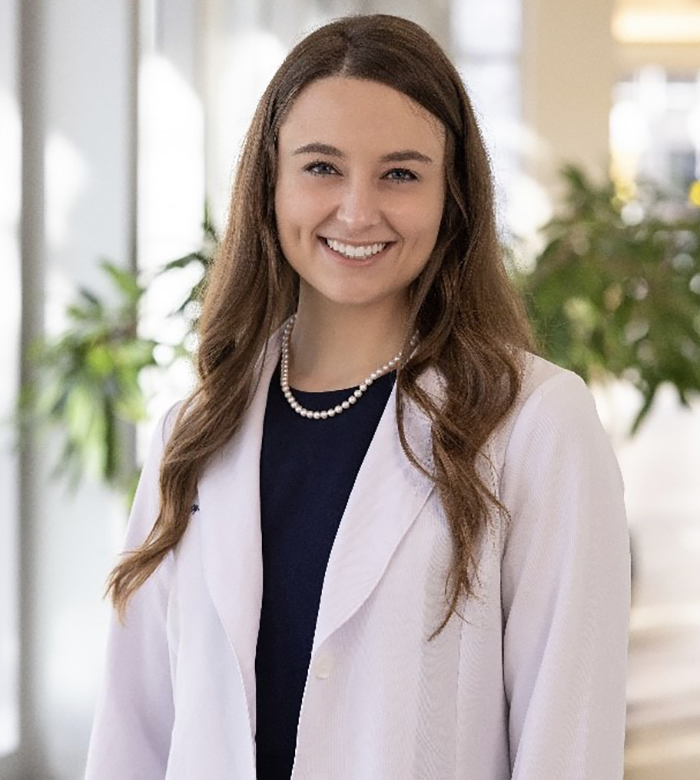
Kelly Dougherty, MD
Kelly Dougherty, MD, is a resident at Mercy Family Medicine in St. Louis, MO. She is a 2025 recipient of a STFM Foundation Faculty for Tomorrow Resident Scholarship.
Dr Dougherty's Family Medicine Story
Why are you interested in teaching family medicine?
Dr Dougherty: Family medicine is my passion, and I feel a personal responsibility to mentor others who share this calling. While I share this sentiment and many of the classic “whys” common amongst the best teachers of family medicine, I feel I bring a unique perspective to teaching our specialty with my love for teaching both patient-level and legislative advocacy skills to students.
Advocacy is a critical form of patient care which is often not adequately taught in our medical schools, and I aim to cultivate this responsibility in our future physicians. While I wish every student found their home with family medicine as I did, I fully recognize we need a team of physicians for our patients to get the care they deserve. Because of this, I also look forward to teaching students who wish to go into other specialties. Students pursuing other specialties can provide better care to our patients if they understand the importance of family physicians and the irreplaceable role we play in our health care system. I hope to foster their respect for family physicians and highlight the importance of communication with primary care physicians. By setting this tone, I hope to do my part to help further the advancement of family physicians in the house of medicine and work to improve working relationships amongst specialists to achieve better outcomes for myself, my family, and patients for years to come.
Finally, I would not be where I am today without the family physicians who mentored me. I have endless respect for my teachers who model family medicine. Many of these physicians are strong women who are also mothers, teachers, advocates, and leaders, in addition to being incredible family physicians. They showed me how to lead health care organizations and households, to advocate for their patients and our specialty, and to teach while being a lifelong learner. My interest in teaching family medicine sparked when I worked with these incredible humans, and I hope to give back to my future students the way they have given so much to me. I strive to impact their lives in similar ways and allow them to soar to achievements they believed they could only dream of while leading Family Medicine into our bright future.
How do you think you can make a difference in the future of family medicine?
Dr Dougherty: I will strive to leave my mark on family medicine by listening. By listening to patients, students, stakeholders, and other members of the health care system I hope to empower others to share their story and honor their journey. By fostering this essential step in belonging, I will aim to humbly lead, advocate, and teach.
The classic saying goes, “People don’t remember what you said, they remember the way you make them feel,” and I continually aim to exemplify this. I feel listening and humbly leading will allow me to leave family medicine better than I found it in multiple ways.
First, I think this leadership style will allow me to best provide care for my individual patients and lead my clinical team effectively. I also feel listening intentionally will allow me to best lead boards or committees in organized medicine by encouraging the flow of ideas amongst great minds and summarizing thoughts to create action plans.
While I passionately share my lived experiences as a rural American living in an under resourced area, I also aim to intentionally listen to those for whom I advocate, for both patients and other physicians. As a physician, I am privileged to have a voice in powerful spaces.
To best advocate for individuals not present, it is my duty to intentionally listen and empathize with their experiences to best honor them when communicating on their behalf. I believe my skills as a listener and advocate will allow me to positively impact legislative advocacy and health policy in a manner that will improve the future of family medicine.
Most importantly, though, I hope by listening to my students, I am able to empower them to feel heard, to chase their dreams, and to give back to the future of family medicine. These students and mentees can achieve exponentially more than I ever could on my own, and I hope that by simply listening, teaching, and empowering these individuals, my legacy will impact family medicine for years well beyond the end of my budding career.
Contribute to the Creation of the Next STFM Story
Transforming the future of family medicine would not be possible without the generosity of countless STFM members and supporters. Through both member and departmental donations, the STFM Foundation is able to support the pipeline for academic family medicine.
Help transform the future of academic family medicine by donating to the STFM Foundation. If you have questions about the STFM Foundation, contact Mindy Householder at (800) 274-7928 or mhouseholder@stfm.org.




